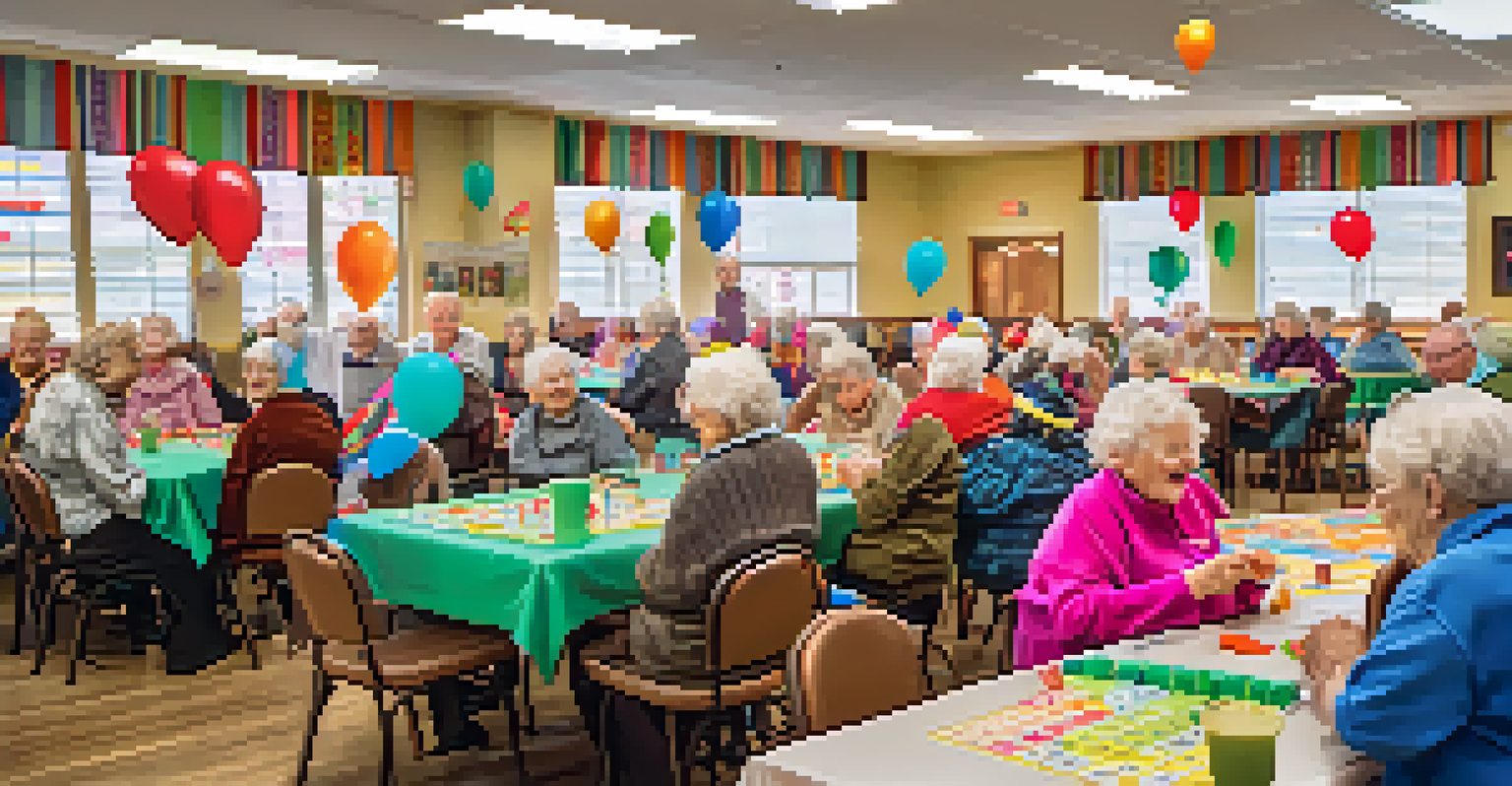Social Engagement and Its Impact on Elderly Well-being

Understanding Social Engagement in the Elderly
Social engagement refers to the interactions and relationships that individuals maintain with others. For the elderly, this can include participating in community events, joining clubs, or simply connecting with family and friends. These interactions are crucial for emotional and mental health, as they provide a sense of belonging and purpose.
Social connections are the key to well-being and happiness for older adults.
As people age, social circles may shrink due to various factors like retirement or the loss of loved ones. This can lead to feelings of isolation and loneliness, which are detrimental to overall well-being. Therefore, fostering social connections becomes increasingly important.
Engaging socially can take many forms—whether it's a weekly book club, a coffee date with a friend, or volunteering at a local charity. Each of these activities helps to create bonds, enrich lives, and combat feelings of loneliness.
The Psychological Benefits of Social Interaction
Social interaction has profound psychological benefits for the elderly. Engaging with others can boost self-esteem, foster a positive outlook on life, and reduce symptoms of depression and anxiety. When older adults feel connected, they are more likely to report higher levels of happiness.

For example, consider an elderly person who joins a community gardening club. Not only do they learn about gardening, but they also meet new friends and share experiences. This sense of community can uplift their spirits and enhance their mood significantly.
Social Engagement Boosts Well-Being
Maintaining social connections is crucial for the emotional and mental health of the elderly, helping to combat loneliness and enhance their quality of life.
Moreover, social interactions can stimulate cognitive function. Engaging in conversations and participating in group activities challenges the mind, helping to keep it sharp and alert. This mental engagement is essential for maintaining cognitive health as one ages.
Physical Health and Social Connections
Believe it or not, social engagement also plays a role in physical health. Studies have shown that older adults with strong social networks tend to have better health outcomes, including lower blood pressure and reduced risk of chronic diseases. This connection can be attributed to the influence of social support on health-related behaviors.
The greatest gift of life is friendship, and I have received it.
For instance, a senior citizen who regularly meets friends for walks not only enjoys their company but also benefits from the physical activity. This combination of social and physical engagement contributes to a healthier lifestyle.
Additionally, emotional support from friends and family can lead to better adherence to medical advice and healthier lifestyle choices. The encouragement that comes from social circles can motivate elderly individuals to stay active and manage their health proactively.
Combating Loneliness Through Community Activities
Community activities are a fantastic way for the elderly to combat loneliness. Local senior centers often offer a variety of programs, from fitness classes to art workshops, that encourage participation and social interaction. These activities not only provide entertainment but also foster friendships.
Imagine a weekly bingo night at a community center. It's a simple game, but it brings people together, sparks laughter, and creates lasting memories. These shared experiences can help build a supportive community for older adults.
Community Activities Foster Bonds
Participating in local programs and events can significantly reduce feelings of isolation among seniors, while also encouraging new friendships and hobbies.
Moreover, participating in community activities can also lead to new hobbies and interests. When seniors engage with others, they often discover passions they didn't know they had, enhancing their quality of life even further.
Technology's Role in Enhancing Social Connections
In today's digital age, technology plays a crucial role in helping seniors stay connected. Video calls, social media, and various apps can bridge the gap between those who may be physically distant. This is especially important for elderly individuals who may have mobility issues or live far from family.
For example, a grandparent can use video calling to read bedtime stories to their grandchildren, creating cherished moments despite the distance. This ability to connect virtually helps maintain relationships and provides emotional support.
However, it's important to ensure that technology is user-friendly for seniors. Offering training sessions at community centers or through family members can empower older adults to embrace these tools, making social engagement more accessible.
The Importance of Family Support in Social Engagement
Family support is a vital component of social engagement for the elderly. Regular visits, phone calls, and shared activities can significantly enhance an older person's sense of connection and belonging. When family members make an effort to stay involved, it creates a strong support network.
Consider the impact of a weekly family dinner. This simple tradition can provide an opportunity for sharing stories, laughter, and love, reinforcing family bonds. Such moments can be a source of joy and comfort for elderly individuals.
Technology Connects Families
Digital tools like video calls can bridge distances, allowing elderly individuals to maintain relationships and receive emotional support from family members.
Moreover, family members can encourage their elderly relatives to participate in community activities, helping them build new friendships outside the family unit. This balance between family and social connections is essential for holistic well-being.
Creating Opportunities for Social Engagement
Creating opportunities for social engagement is essential for improving elderly well-being. Communities can play a significant role by organizing events, workshops, and social gatherings tailored for seniors. This proactive approach can help combat isolation and foster connections.
For instance, libraries and community centers can host intergenerational programs that bring together young people and seniors. These interactions can benefit both age groups, as younger individuals gain wisdom, while older adults feel valued and included.

Additionally, encouraging local businesses to offer senior discounts or host special events for older adults can further enhance social engagement. Simple initiatives can lead to significant improvements in the quality of life for the elderly.